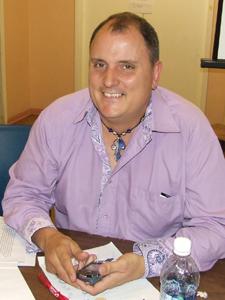Former Vancouver Pride Society treasurer Ken Coolen was unanimously elected new president of the organization Nov 1 at another marathon-length but comparatively calmer annual general meeting than last year.
Coolen, who was voted in for a three-year term, replaces John Boychuk who helmed the Society for the last three years and is now running for city council as an independent in the municipal election Nov 15.
Speaking with Xtra West after his election as president, Coolen says Vancouver Pride’s status as “probably the premier single-day event” in the city means it’s lucky to be able to attract sponsorships. He notes, however, that as costs increase, it’s going to be harder for sponsors to “give us the dollars.”
“What is the city going to do?” he asks.
“I would hazard a guess that more than half of the parade do not recognize themselves as GBLT. I think at least 250,000 people come from other communities of our city and of our Lower Mainland, and we’re entertaining them for three hours. That’s something that the city needs to stand behind in a bigger way,” Coolen says.
In presenting the treasurer’s report, Coolen noted that the 2008 parade entry fees “went up quite a bit,” adding that this was the first time the parade lost money since his involvement with it. Coolen, who has been involved with the parade as a director for the last three years, says the bill from the city more than doubled.
“The reality is we did increase the parade route, which required more street closures, more signage, more police, so I get that that’s what it is,” he acknowledged.
According to the report, the parade cost the Pride Society just over $56,000 to stage this year, $20,000 of which went to the city for assorted fees.
“The original bill from the city for the parade was $30,000,” Coolen notes, “but they gave us a grant for $10,000 so we ended up paying $20,000.”
Last year, the Pride Society spent just over $33,000 to put on the parade, of which approximately $10,000 went to city fees, Coolen estimates.
This year’s city requirement for more fencing in more areas along the parade route cost the Pride Society at least an extra $10,000, he says.
“Last year, we were lucky because we got a real break because the city was on strike. They didn’t charge us the full amount because a lot of the services were done by management who couldn’t bill us for what they did,” Coolen points out.
“Excuse me for saying so, but this is a great time to talk to some of those people who want to run the city in the next couple weeks, and [tell] them that the Pride Society shouldn’t be paying that much to put on a one-day celebration for the city,” Coolen told the AGM crowd.
“Over the last three years, the government we have at city hall has been trying to —my understanding is —reformulate the process in the application associated with being deemed a civic event,” Boychuk said in response to a question about achieving civic status. “At this point, there is no application, there is no way of applying” despite the many approaches made to different city politicians and departments.
When Xtra West asked the Vision Vancouver, COPE and NPA council candidates how city hall can best support Vancouver’s growing Pride celebrations, most of the eight Vision candidates specifically pointed to the possibility of designating Pride a civic event.
COPE’s Ellen Woodsworth also supported such a measure. Not one of the 10 NPA candidates brought up the idea of according Pride civic status.
Despite losing money on the parade itself, as well as the post-parade festival, East Side Pride and the inaugural Davie St Dance Party, the Pride Society finished the year with a net income of about $18,000.
The Davie St Dance Party made just over $67,000 in gross revenues from beer sales, entry fees and sponsorship, says Boychuk. But it cost almost $63,000 to stage, including beer and equipment expenses and the $10,000 flat fee paid to John Donnelly and Associates to manage the event. Subtract the profit sharing agreements with Donnelly and Smart Cookie Consulting on top of that and the event made a net profit of $500 before insurance costs, according to Boychuk.
But those standard insurance costs are allocated evenly across all the Pride Society events, Boychuk explains, so it’s not as if the Davie St Dance Party cost the community any money —despite its $2,087.87 loss recorded in the Society’s financial statement.
“Did it cost the community anything? No,” he insists. “Did it cost the VPS anything? No.”
What it offers is a blueprint for the community to move forward in the future with a street party for Pride, says Boychuk.
Next year, adds Coolen, the Pride Society board will decide whether the street party should be produced in-house or contracted out once again.
Apart from pressing the city to help reduce the cost of putting on Pride, Coolen says another priority is to instill more awareness of Pride’s history and the queer community’s history in general.
“[Pride] was 17 people marching down the street and having things thrown at them, and booed and hissed. They weren’t dancing with their underwear on top of loudspeakers and having all that fun, and I think that we really need to pay homage to that,” he says.
He would also like to see Vancouver Pride start doing more outreach to the 17 other Prides in BC.
In other business, the Pride Society passed motions to establish a committee to explore in-house the rebranding of the organization’s logo; to review the Society’s existing constitution and bylaws; and to hire an administration assistant to serve from January to October 2009.
Apart from Coolen’s election, a new treasurer and eight new directors were voted in to serve two-year terms on the Pride board.


 Why you can trust Xtra
Why you can trust Xtra


